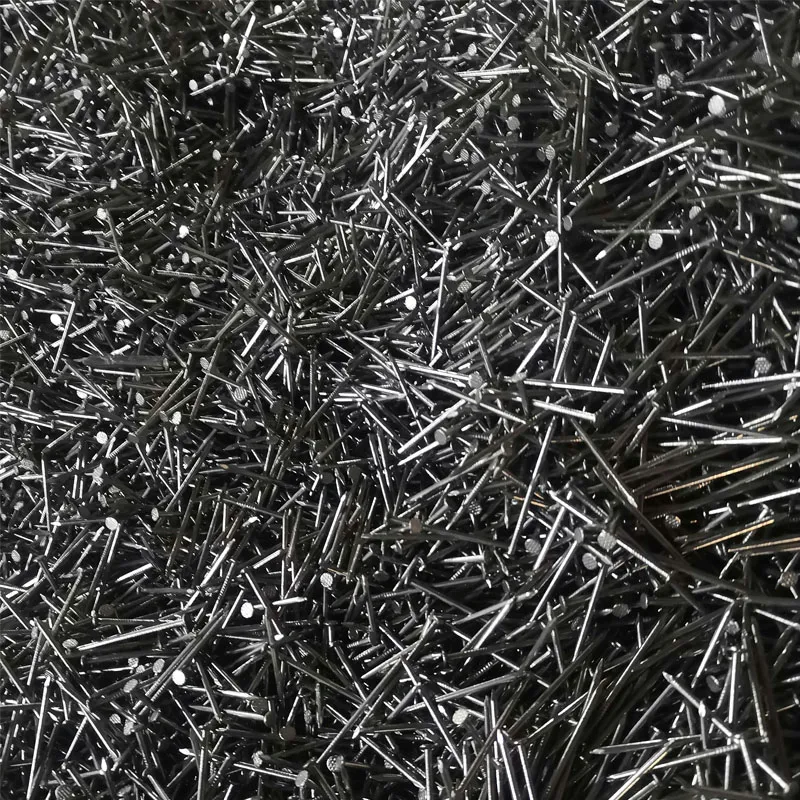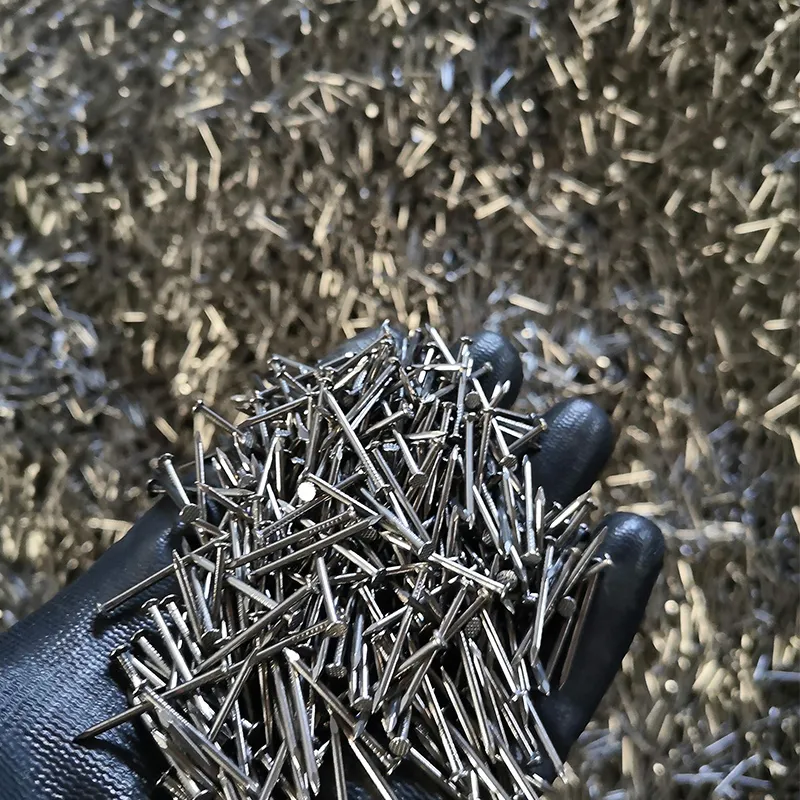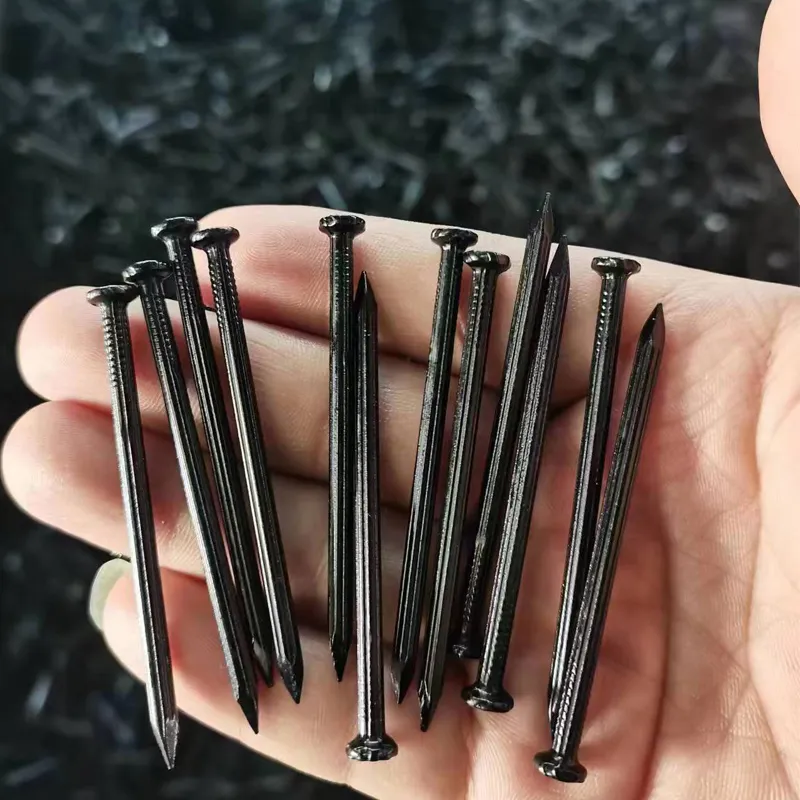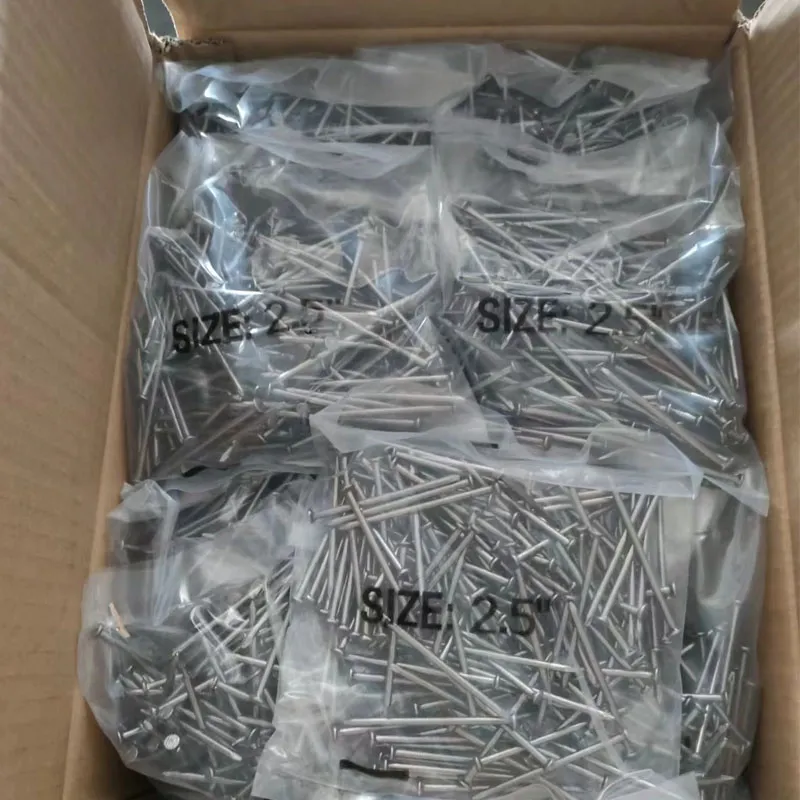Sep . 13, 2025 09:40 Back to list
Your Common Nail Factory: Durable Construction & Building Nails
Understanding the Advanced common nail factory Landscape
The modern construction and manufacturing sectors rely heavily on robust fastening solutions. At the core of many structural and finishing applications lies the humble, yet indispensable, common nail. A dedicated common nail factory integrates advanced metallurgical science with precision engineering to produce fasteners that meet stringent industry demands. This comprehensive overview delves into the critical aspects of common nail production, market trends, technical specifications, and the strategic advantages offered by specialized manufacturers. We aim to provide B2B decision-makers and procurement specialists with deep insights into selecting high-quality construction nails and building nails for their projects.
From raw material selection to final quality assurance, every stage in a reputable common nail factory is optimized for performance, durability, and cost-effectiveness. Understanding these intricate processes is crucial for ensuring product reliability in diverse applications, from residential framing to heavy industrial construction.
Industry Trends in Construction and Building Nails
The market for construction nails and building nails is dynamic, driven by innovation in materials science, automation, and evolving regulatory standards. Key trends include:
- Sustainable Materials: A growing emphasis on eco-friendly manufacturing processes and the use of recycled steel or steel with lower carbon footprints. Companies are exploring sustainable coatings that minimize environmental impact while maintaining performance.
- Enhanced Corrosion Resistance: Demand for galvanized, mechanically plated, or polymer-coated nails is surging, especially for exterior applications and projects in harsh environments (e.g., coastal regions, industrial zones). This extends the service life and reduces maintenance costs.
- Automation and Precision Manufacturing: Modern common nail factory operations are increasingly automated, utilizing CNC-controlled machinery for higher precision, reduced waste, and consistent quality, leading to fasteners that meet exact dimensional and performance specifications.
- Specialized Applications: While common nails remain foundational, there's a trend towards application-specific nails, often with unique head designs, shank patterns, or tip geometries to optimize performance for specific materials (e.g., engineered wood products) or fastening tools.
- Supply Chain Resilience: Geopolitical shifts and global events highlight the importance of diversified and robust supply chains. Manufacturers are investing in localized production and stronger partnerships to ensure consistent availability of essential building nails.

Automated production line ensuring high-volume, consistent output at a modern common nail factory.
Manufacturing Process of Common Nails
The production of common nails in a sophisticated common nail factory is a meticulously engineered process, ensuring each nail meets precise specifications for strength, durability, and functionality. This process typically involves several key stages:
1. Raw Material Sourcing and Preparation
The foundation of a high-quality common nail is the selection of appropriate steel wire. Typically, low-carbon steel wire (e.g., SAE 1006, 1008, or 1010 grades) with specific tensile strength and ductility is used. This wire arrives at the factory in large coils, subjected to initial quality checks for material composition, surface integrity, and dimensional accuracy to ensure compliance with international standards like ASTM F1667 (Standard Specification for Driven Fasteners: Nails, Spikes, and Staples).
2. Wire Drawing
If the incoming wire gauge is not the final desired diameter for the nail shank, it undergoes a wire drawing process. The wire is pulled through a series of progressively smaller dies, reducing its diameter while simultaneously increasing its tensile strength and improving surface finish. This cold working process is critical for achieving the specified mechanical properties of the finished building nails.
3. Nail Heading and Pointing (Cold Forming)
This is the core of nail manufacturing. High-speed nail-making machines feed the straightened wire into a die. A gripping mechanism holds the wire, and a ram strikes one end to form the head (cold heading), while a cutting tool simultaneously forms the point on the other end, severing the nail from the continuous wire. Modern machines can produce thousands of nails per minute with exceptional consistency.
4. Shank Grooving/Threading (Optional)
For specialized construction nails requiring enhanced withdrawal resistance, such as ring shank or screw shank nails, the shanks are further processed. Rolling dies imprint helical or annular grooves onto the nail shank, increasing the surface area for material engagement and significantly boosting holding power.
5. Surface Treatment and Finishing
Depending on the application, nails may undergo various surface treatments:
- Tumbling/Polishing: Removes burrs and sharp edges, improving aesthetics and handling.
- Galvanization: Hot-dip or electro-galvanization applies a protective zinc coating, offering superior corrosion resistance for exterior and high-humidity applications. This significantly extends service life.
- Phosphate Coating: Provides a base for paint adhesion and offers moderate corrosion protection.
- Vinyl Coating: Reduces friction during driving, allowing for easier penetration.
6. Quality Control and Testing Standards
A rigorous quality assurance protocol is essential. Testing includes:
- Dimensional Accuracy: Verification of length, diameter, head size, and point sharpness according to ANSI B18.1.1 (Small Solid Rivets) or ASTM F1667.
- Tensile Strength & Bending Test: Ensures the nail can withstand driving forces without bending or breaking, complying with ISO 898-1 (Mechanical properties of fasteners).
- Withdrawal Resistance: Crucial for determining holding power in specific wood types.
- Corrosion Resistance: Salt spray tests (e.g., ASTM B117) for coated nails to simulate harsh environmental conditions and assess anticipated service life, which for properly galvanized nails can exceed 50 years in suitable environments.
- Shear Strength: Critical for structural applications, often tested against specific building codes.

Detailed inspection of common nails for dimensional accuracy and surface finish at the factory.
7. Packaging
Finished nails are counted, weighed, and packaged into various formats: bulk cartons, small retail boxes, or collated strips for pneumatic nailers. Packaging is designed to protect the nails during transit and storage, preventing damage and corrosion.
Technical Specifications of Common Nails
Selecting the right construction nails requires a thorough understanding of their technical parameters. Below is a representative table outlining typical specifications for common nails, produced by a diligent common nail factory:
| Parameter | Typical Range/Value | Standard Compliance |
|---|---|---|
| Material | Low carbon steel (SAE 1006-1010) | ASTM F1667 |
| Length | 19 mm - 150 mm (0.75" - 6") | ANSI B18.1.1 |
| Shank Diameter | 1.6 mm - 6.0 mm (16-6 gauge) | ASTM F1667 |
| Head Diameter | Typically 2-2.5x shank diameter | Manufacturer Specific |
| Tensile Strength | 350-550 MPa (50-80 ksi) | ISO 898-1 |
| Surface Finish | Bright, Electro-Galvanized, Hot-Dip Galvanized, Phosphate, Vinyl Coated | ASTM A153 (HDG), ASTM B695 (Mech. Galv.) |
| Corrosion Resistance | Varies by coating (e.g., HDG: 1000+ hrs salt spray) | ASTM B117 |
| Shear Strength | Dependent on size and material, typically >200 lbs/nail | ICC-ES AC118 |
These specifications are crucial for engineers and project managers to ensure that the chosen nails provide the necessary structural integrity and longevity for their applications. Adherence to these standards guarantees reliability and compliance with building codes.
Application Scenarios and Target Industries
Common nails, supplied by a proficient common nail factory, are foundational fasteners across a multitude of industries due to their versatility and cost-effectiveness.
- Residential and Commercial Construction: The primary application for building nails. Used extensively for framing, sheathing, subflooring, roofing (especially with common and roofing nails), and trim work. Their robust shear strength is vital for structural integrity in timber frames and modular construction.
- Woodworking and Carpentry: Essential for furniture manufacturing, cabinet making, deck construction, fencing, and various DIY projects where strong, concealed, or visible fastenings are required.
- Packaging and Crating: Heavy-duty common nails are ideal for assembling wooden crates, pallets, and shipping container111s, ensuring secure transport of goods. Their strength prevents package disintegration under stress.
- Infrastructure Projects: While more specialized fasteners are often employed, common nails find use in temporary structures, formwork for concrete casting in bridges and buildings, scaffolding assembly, and general utility fastening in maintenance and repair within sectors like railway infrastructure and utility pole installation.
- Agriculture: Used in constructing farm buildings, fences, trellises, and other agricultural structures, often benefiting from galvanized finishes for outdoor exposure.
The adaptability of common nails across these diverse scenarios underscores the importance of a reliable manufacturing partner capable of meeting varied demand with consistent quality.

Common nails ready for deployment in various construction and woodworking projects.
Technical Advantages of Quality Common Nails
Sourcing common nails from a reputable common nail factory provides several distinct technical and operational advantages:
- Superior Shear Strength: Designed with a larger shank diameter compared to finish nails, common nails excel in resisting forces parallel to the fastener axis, making them ideal for structural connections where lateral loads are a concern. This is critical for reliable timber framing.
- Optimized Withdrawal Resistance: While their smooth shanks offer moderate pull-out resistance, specialized coatings (like vinyl) and rough finishes can enhance grip. For applications requiring maximum withdrawal strength, ring or screw shank variants are available, significantly increasing the force needed to remove the nail.
- Corrosion Resistance Options: High-quality galvanized nails (hot-dip or electro) provide robust protection against rust and environmental degradation. Hot-dip galvanization, with its thicker zinc coating (typically 2-4 mils), can extend nail service life by decades in outdoor or humid conditions, minimizing structural deterioration and associated repair costs.
- Material Compatibility: Engineered to perform well across various wood species, plywood, and other construction materials. The selection of specific nail types (e.g., hardened steel nails for dense lumber) ensures optimal fastening without material splitting or fastener failure.
- Cost-Effectiveness and Availability: As a standard fastener, common nails offer an excellent balance of performance and economic value. Their widespread use ensures consistent availability, reducing procurement lead times and project delays for construction nails.
These technical attributes underscore why common nails remain a cornerstone of reliable construction.
Vendor Comparison for Common Nails
Choosing the right supplier for building nails is paramount. Key factors differentiate a top-tier common nail factory from others. This table provides a comparative overview of essential criteria:
| Criterion | Leading Manufacturer Profile | Standard Supplier Profile |
|---|---|---|
| Quality Certifications | ISO 9001:2015, ASTM, ANSI, CE marking, third-party lab reports. | Basic factory QC, possibly internal certifications. |
| Material Traceability | Full traceability from raw steel coil to finished product, mill certificates. | Limited or no batch-specific traceability. |
| Product Range & Customization | Extensive stock, custom sizes, materials, coatings, and head/shank designs available. | Standard sizes and finishes only. |
| Lead Time & Logistics | Optimized production, efficient global logistics, inventory management for JIT delivery. | Longer lead times, less flexible shipping options. |
| Technical Support & R&D | Dedicated engineering support, R&D for new product development, application guidance. | Basic product information, limited technical assistance. |
| Environmental Compliance | Adherence to RoHS, REACH, and other environmental directives; sustainable practices. | Minimal or no specific environmental compliance. |
This comparison highlights that while price is a factor, the long-term value, reliability, and support offered by a leading manufacturer often outweigh initial cost savings from lesser-known suppliers.
Customized Solutions from a Common Nail Factory
Beyond standard offerings, many B2B projects require fasteners tailored to unique specifications. A forward-thinking common nail factory specializes in delivering customized solutions for specific structural, aesthetic, or environmental demands.
- Material Variation: While low-carbon steel is standard, specialized projects might require stainless steel for extreme corrosion resistance (e.g., marine environments) or hardened carbon steel for enhanced shear strength in dense substrates.
- Dimensional Specificity: Custom lengths, shank diameters, and head geometries (e.g., larger head for increased bearing surface, smaller head for countersinking) can be manufactured to precisely fit unique application requirements, optimizing performance and reducing material stress.
- Advanced Coatings: Beyond standard galvanization, custom orders can include specialized polymer coatings for specific aesthetic finishes (e.g., color-matching for siding), or enhanced chemical resistance for industrial applications.
- Shank and Point Design: Tailored shank patterns (e.g., deeper ring shanks for higher withdrawal resistance in softwoods, modified screw shanks for easier driving) and unique point designs (e.g., chisel point for reduced splitting) can be developed to overcome specific installation challenges.
- Packaging Solutions: From bulk industrial packaging to precise quantities for kitting in manufacturing lines, customized packaging improves logistical efficiency and reduces waste on site.
These bespoke capabilities ensure that even the most demanding construction or manufacturing projects can procure fasteners that are perfectly aligned with their technical and operational needs.

A selection of common nails, including customized options for various applications.
Application Case Studies: Building with Confidence
Real-world applications demonstrate the tangible benefits of high-quality construction nails from a reliable source.
Case Study 1: Large-Scale Residential Framing Project
A major residential developer undertook the construction of 50 new homes, requiring consistent quality and high volumes of building nails for framing and sheathing. Partnering with a leading common nail factory, they specified hot-dip galvanized common nails for all exterior structural components and bright common nails for interior framing.
- Challenge: Ensuring structural integrity against variable weather, consistent nail supply, and minimizing fastener-related failures.
- Solution: The factory provided nails manufactured to ASTM F1667 standards with documented tensile and shear strengths. Bulk packaging and managed logistics ensured just-in-time delivery to multiple job sites.
- Outcome: Zero reported nail failures over two years, reduced labor time due to consistent nail quality (fewer jams in nail guns), and successful completion of the project ahead of schedule, with positive feedback on fastener reliability.
Case Study 2: Marine Boardwalk Restoration
A coastal municipality needed to restore a 2km boardwalk, demanding fasteners with extreme corrosion resistance. Standard galvanized nails had previously failed prematurely in the harsh saline environment.
- Challenge: Severe saltwater corrosion, long service life requirement (50+ years), and structural integrity under heavy pedestrian traffic.
- Solution: The common nail factory provided custom-ordered hot-dip galvanized common nails with an extra-thick zinc coating (meeting ASTM A153 Class D) and a ring-shank profile for maximum withdrawal resistance in treated lumber.
- Outcome: Independent testing confirmed superior corrosion resistance, projecting an extended service life far exceeding previous fasteners. The enhanced withdrawal resistance provided exceptional structural stability for the boardwalk, ensuring public safety.
Frequently Asked Questions (FAQs)
Q: What is the primary difference between common nails and other types like finish nails?
A: Common nails have a thicker shank and a wider, flat head, designed for maximum holding power and shear strength, making them ideal for structural applications. Finish nails have a thinner shank and a smaller, conical head that can be easily countersunk and concealed, primarily used for trim and decorative work where appearance is critical.
Q: How do I choose the correct nail size and type for my project?
A: The choice depends on the material thickness, load requirements, and environmental exposure. Generally, the nail should be three times the thickness of the material being fastened, and at least two-thirds of its length should penetrate the base material. For outdoor use or treated lumber, galvanized construction nails are recommended. Consult relevant building codes and product specifications for critical applications.
Q: What is the typical lead time for bulk orders from a common nail factory?
A: Lead times can vary based on order volume, customization requirements, and current production schedules. For standard products, expect 2-4 weeks. Customized or very large orders may require 4-8 weeks. We recommend contacting our sales team directly for precise lead time estimates based on your specific requirements and to discuss expedited options.
Lead Time, Fulfillment & Logistics
Our commitment as a leading common nail factory extends beyond manufacturing to ensuring efficient and reliable delivery.
- Standard Lead Time: For common nail products in standard specifications, typical lead times range from 15 to 25 business days from order confirmation to dispatch.
- Custom Order Lead Time: Customized orders, involving specific materials, sizes, or coatings, may require 30-45 business days to accommodate tooling, material procurement, and specialized production processes.
- Fulfillment: We operate a robust inventory management system, enabling efficient processing of orders, whether small batch or high volume. All products undergo final inspection prior to packaging.
- Logistics: We partner with trusted global logistics providers to offer flexible shipping options including sea, air, and land freight. We manage all export documentation and customs clearance processes to ensure smooth international delivery to your designated port or facility. Expedited shipping is available upon request.
Warranty Commitments & Customer Support
Our dedication to quality is backed by comprehensive warranty programs and responsive customer support, ensuring peace of mind for all our clients.
- Product Warranty: All common nails manufactured by us come with a standard 1-year warranty against manufacturing defects and material flaws, provided they are used in accordance with their intended purpose and industry best practices. Specific coatings (e.g., hot-dip galvanization) may carry extended performance guarantees against corrosion, details of which are provided upon request.
- Quality Assurance: We adhere to ISO 9001:2015 certified quality management systems. In the unlikely event of a product issue, our dedicated QA team will conduct a thorough investigation, including material analysis and production batch tracing, to resolve concerns promptly.
- Technical Support: Our team of experienced technical engineers is available to provide guidance on product selection, application best practices, and troubleshooting. We offer pre-sales consultation and post-sales support to ensure optimal product integration into your projects.
- Customer Feedback: We value customer input and continuously strive to improve our products and services. Feedback mechanisms are in place to capture insights and drive continuous improvement, reinforcing our position as a trusted supplier of construction nails and building nails.
For any inquiries regarding product specifications, orders, or support, please do not hesitate to contact our dedicated sales and customer service teams.
Authoritative References
- American Society for Testing and Materials (ASTM). ASTM F1667-15, Standard Specification for Driven Fasteners: Nails, Spikes, and Staples. ASTM International, West Conshohocken, PA, 2015.
- American National Standards Institute (ANSI). ANSI B18.1.1, Small Solid Rivets. 1972.
- International Organization for Standardization (ISO). ISO 898-1:2013, Mechanical properties of fasteners made of carbon steel and alloy steel — Part 1: Bolts, screws and studs with specified property classes — Coarse thread and fine pitch thread. 2013.
- International Code Council Evaluation Service (ICC-ES). AC118, Acceptance Criteria for Nails. 2019.
- Zinc Institute. Hot-Dip Galvanizing for Corrosion Protection: A Guide. 2020.
-
Pre Cut Wire - Straightened, Deburred, Custom Lengths
NewsNov.17,2025
-
Binding Wire for Sale - Durable, Rust-Resistant, Bulk Deals
NewsNov.17,2025
-
Field Fencing for Horses – Safe, Durable, Easy Install
NewsNov.17,2025
-
Euro Fence Factory: Durable, Custom Euro Style Fences
NewsNov.17,2025
-
Euro Fence Factory: Durable OEM Panels, Direct Pricing
NewsNov.17,2025
-
Chain Link Fence Suppliers | Galvanized, Factory-Direct
NewsNov.11,2025









